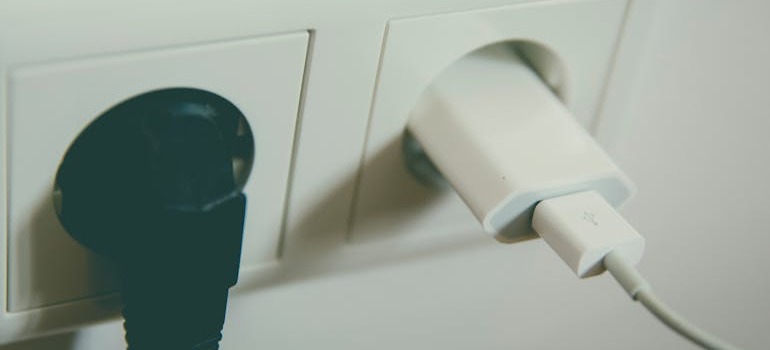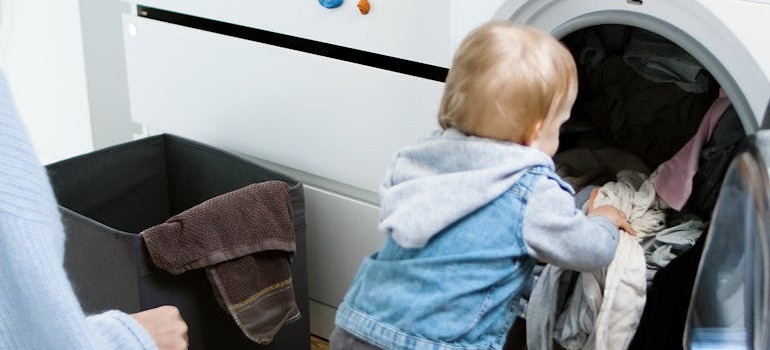Get Your Free Estimate Now
"*" indicates required fields
Getting ready to move to Nepean will force you to think about various items. Of course, you can turn to Professional Movers Ottawa to get assistance that is efficient and affordable. However, besides experts, we can also offer you advice on how to safely move large appliances. Even the smallest of details count, so you need to prepare as much as possible. Let’s go over things you want to do in order to secure the larger and heavier appliances.
Gather the necessary equipment
Use a dolly with strong wheels to support heavy loads. Secure appliances with moving straps to keep them steady. Wrap fragile surfaces in blankets to prevent scratches. Slide heavy items easily using furniture sliders. Tape down cords to avoid tripping hazards. Pack loose parts in moving boxes to keep everything organized. If stairs are a concern, use a stair-climbing dolly for better control. Keep gloves nearby for a firm grip. Have a toolset ready for quick disassembly. Proper equipment ensures safe lifting, smooth transport, and fewer risks of damage or injury. Here are just some pieces of equipment you’ll use, including:
- Lifting Straps
- Furniture Pads
- Ramp or Loading Dock
- Appliance Dolly
- Packing Tape

Clean and prepare each appliance
Unplug appliances 24 hours before moving to let them defrost and dry. Empty refrigerators and ovens, removing shelves and trays. Secure doors with rope or strong tape to keep them shut. Drain washing machines fully and detach hoses to avoid leaks. Wipe surfaces clean to prevent dirt buildup during transport. Store small parts, such as oven racks or fridge drawers, in labeled boxes. If space is tight, check storage facilities for large items to keep appliances safe. Proper preparation reduces the risk of damage and makes loading more efficient.
Protect doors and floors
Place furniture sliders under appliances to reduce friction and prevent floor damage. Use cardboard or plywood sheets for extra protection on hardwood and tile. Then, cover door frames with blankets or foam padding to avoid dents. If space is tight, remove doors temporarily to create a wider path. Secure cords and handles with tape to prevent snags. Heavy appliances require steady movement—dragging can cause scratches. For complex moves, hiring experienced Nepean movers ensures safe handling. Protecting floors and doors reduces repair costs and keeps the home in good condition.
Secure cords and hoses
Tape or tie power cords and hoses tightly to the back of each appliance. This prevents tripping hazards and stops them from getting caught or damaged. Use strong zip ties or electrical tape to keep cords in place. For washing machines, secure the drain hose to avoid leaks. Refrigerators often have a water line—shut it off and disconnect it properly. Gas stoves require extra care. Turn off the gas supply and call a professional for a safe disconnection. Taking these steps keeps the move smooth and prevents damage to appliances and floors.

How to safely move large appliances? Lift and load with care
Do not lift big appliances by yourself. To distribute the weight uniformly, use a dolly equipped with moveable straps. To avoid internal damage, hold the appliance upright during loading. Lift correctly and prevent damage, bend your knees rather than your back. Make sure someone else helps to steer the device. To improve weight distribution, position bulky items close to the rear of the truck. Use straps to hold equipment firmly in place. To safeguard delicate surfaces, use cushioning. To avoid mishaps and guarantee that your appliances are transported safely, always move slowly and cautiously.
Transporting appliances safely
How to safely move large appliances? Secure appliances with strong straps to prevent shifting during transport. Use moving blankets or foam padding to protect surfaces from dents. Keep refrigerators upright to avoid compressor damage. In cold weather, allow fridges to adjust to room temperature before plugging in. Washers and dryers should have drums stabilized with shipping bolts. If stacking items, place lighter ones on top to prevent crushing. Proper handling reduces the risk of costly repairs. For added protection, consider packing services for appliances to ensure safe delivery and setup in the new home.
Unloading and placement
Use a dolly to properly unload appliances when you arrive. Make sure they remain upright as you gently move them to their assigned locations. To allow the coolant to settle, let freezers and refrigerators wait for a few hours before plugging them on. Verify the connections of stoves and washing machines to gas or water lines once more before placing them. Make sure every hose is snug and safe. Appliances should be tested individually to ensure good operation. When handling sensitive surfaces, exercise extreme caution and make necessary placement adjustments. By doing this, harm will be avoided, and appliances will function safely in their new place.

Final inspection and setup
Examine every appliance twice for leaks or indications of deterioration. Examine any connections, such as power wires and water pipes. Make sure electrical equipment is powered on and functioning correctly after plugging it in. Look for leaks, malfunctions, or strange noises. Consult the manufacturer’s troubleshooting instructions if any equipment is not functioning as it should. Seek assistance from a specialist if problems continue. To ensure correct operation, test features and settings such as stove heat settings or refrigerator temperature controls. This last check eliminates any possible problems and guarantees that everything is prepared for usage.
Ensure the security of your appliances
Knowing how to safely move large appliances will ensure you have a much easier relocation. Whether it’s a big or small relocation, your appliances need to be safe at all times. From getting the necessary materials and tools to doing a final inspection when the BBB-approved movers complete the relocation, you want to prepare as much as you can. One thing is certain: with our advice, the whole process will be smoother, and you won’t have to stress about your cherished belongings.
Contact Us
How It Works
Quality services and
the highest level of professionalism
Contact our team
Reach out to Professional Movers Ottawa via phone or e-mail

Get a free estimate
Consult with our agents on additional services you may need
Organize your move with ease
Let us guide you through a smooth moving process



